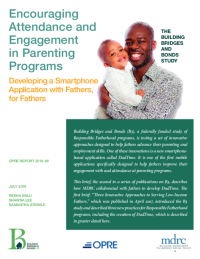Encouraging Attendance and Engagement in Parenting Programs
Developing a Smartphone Application with Fathers, for Fathers

Despite a strong desire to be involved with their children, some fathers experience numerous barriers to doing so. These barriers include not living with their children or having a challenging coparenting relationship with their children’s mother. They may also face barriers to participating in relevant services, such as feeling uncomfortable attending traditional parenting programs or being unable to attend parent support programs because of work responsibilities.
In an effort to improve the well-being of fathers and their children, the U.S. Department of Health and Human Services’ (HHS’s) Administration for Children and Families (ACF) funded a set of Responsible Fatherhood grantees in 2015 that address the particular challenges these fathers face. ACF conceived of the Building Bridges and Bonds (B3) study to learn how new and emerging service approaches might promote Responsible Fatherhood program goals. With funding from the Office of Family Assistance, HHS’s Office of Planning, Research and Evaluation engaged MDRC to conduct the B3 study with six organizations that provide Responsible Fatherhood services, five of which are HHS grantees. In 2016, each of the six local organizations participating in B3 added one or two program components or innovations to their usual services.
In launching the B3 study, MDRC knew that achieving high rates of participation could be difficult, given that fathers served by Responsible Fatherhood programs have a variety of challenging circumstances. Although these programs already invest a great deal of time and effort to encourage fathers’ attendance, many fathers do not complete all their intended activities. Some fathers sign up for but do not attend the first session; other fathers begin but do not complete all sessions. MDRC thought this issue might be particularly challenging for organizations delivering a B3 innovation that was designed to build fathers’ parenting skills, called Just Beginning. Just Beginning requires that fathers and children attend sessions together, which presents a particular engagement challenge for fathers who do not live with their children, because they must coordinate with the coparent to ensure that the child can attend the session with them. In response, the B3 team has sought creative solutions to encourage fathers’ engagement in these programs by drawing on the kinds of behavioral science insights — for example, using “nudges” to encourage particular behaviors — that research has found help people follow through on their intentions in a variety of contexts.
To boost participation in Just Beginning and to address the challenges that fathers face with program attendance, the B3 study team developed the DadTime smartphone application. DadTime is based on the structure and content of Just Beginning, and is used as a supplement to the Just Beginning sessions. It provides fathers with automated program attendance reminders and interactive tools to help them apply what they have learned in Just Beginning sessions to subsequent interactions with their children. DadTime’s content was developed in partnership with the academic team behind the content for the mDad application, one of the first applications designed for fathers that took fathers’ feedback into account. DadTime’s look and feel and its technology platform were created by CauseLabs, an application development firm. The B3 study intends to explore whether fathers who are randomly assigned to participate in Just Beginning will use this type of mobile application, and it will test whether attendance at Just Beginning sessions is higher among fathers who are offered DadTime.






